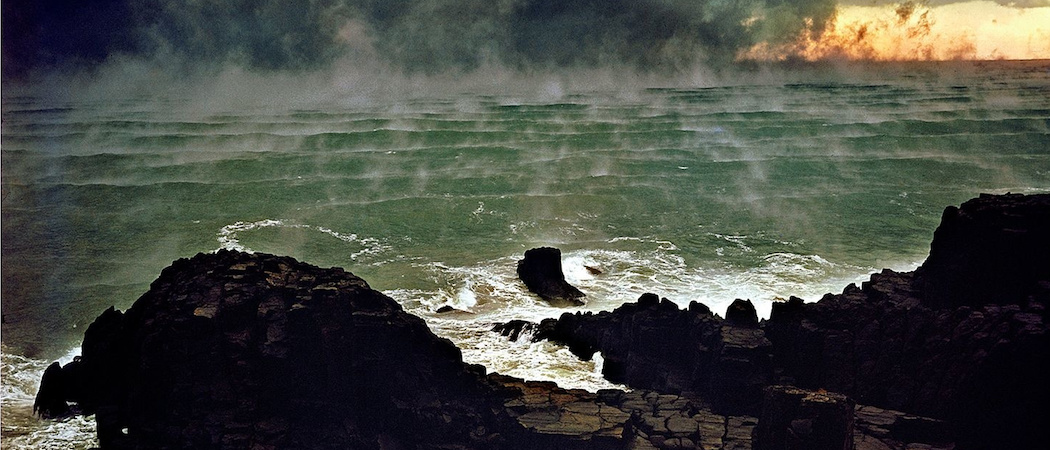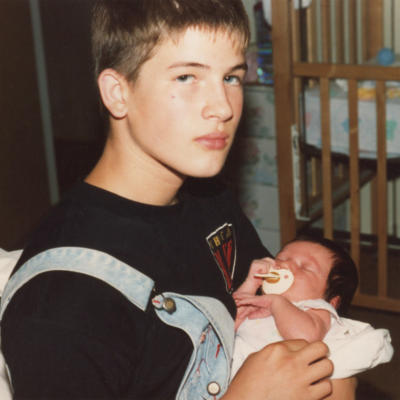When Fleet Foxes rose to the top of the indie pile last decade with their faithfully wide-eyed take on 70's folk-rock, the key to their sound was their glorious, otherworldly harmonies. Nearly ten years after that rustic chorale first soared, it is a decidedly different sound that opens their melancholy and intensely personal third album Crack-Up.
His voice cracking and closely mic'd, his bandmates' voices hovering like ghosts, frontman Robin Pecknold introduces the record with a dirge. The lonely and searching "I Am All That I Need" is actually the first of a three-part suite, and soon the familiar Fleet Foxes sound comes crashing in. There is more edge to the way the band performs than on previous records - a nervous energy that sounds liable at any minute to splinter off into who-knows-where. The suite's racing second part "Arroyo Seco" is marked by momentary diversions into quiet murmuring passages marked by warped bird noises, and dives suddenly from an almost-crescendo complete with strings into the waterlogged and ramshackle "Thumbprint Scar."
The grandiosity of Fleet Foxes' first two albums has been reined in on this record, which allows the band's earnestness to flourish. There is a barrage of ideas here, and even the songs not marked as such play like suites. "Cassius., -" vacillates between shuddering, almost glitchy verses reminiscent of Steve Reich or Philip Glass's minimalism and refrains of supernatural, windswept beauty, but it never feels unfocused or forced. The following track, "- Naiads, Cassidies" is its earthy twin, grounded by club-footed piano and resolute drums.
Fleet Foxes have always been capable of this kind of spiritual transcendence, but in the past their most extravagant moments felt a bit too much like play-acting. These are not campfire songs dressed up as poetry (or vice versa), but entrancing and risk-taking compositions delivered with passion. The record's lead single, the sprawling, nearly nine-minute "Third of May / Ōdaigahara" proves itself to be more than just one of the band's prettiest melodies, but also one of its most fully-formed lyrics - an evocative narrative marked by striking images and recurring metaphor.
Pecknold's fondness for obscure references is here deployed thoughtfully, and into songs that are magnetic and forceful. The dark and deeply introspective "Mearcstapa" refers to the ancient text Beowulf, but bleeds into "On Another Ocean (January/June)" a travelogue through bitter, fading memories with one of the record's most straightforward and rock-influenced arrangements.
Stretching out for nearly an hour, Crack-Up finds Fleet Foxes laying out a map. Not through pastoral vistas like their previous records, but through fractured thoughts and lingering hurt, its terrain unsettled and unstable. Time and distance are compressed in the record's emotional peak, "I Should Go to Memphis." As the song rides updrafts of cool mountain air like an eagle, the view allows Memphis, Tennessee and Memphis, Egypt to overlap, along with Cassius of Rome, Cassius Clay and the American Civil War.
It's remarkable, then, that Crack-Up never feels overwhelming or overstuffed. The arrangements breath exquisitely, and each idea flourishes among constantly changing focal points and adventurous points-of-view. The title track closes the record with surprising warmth - the sound of returning home. Horns echo with both triumph and weariness, and drive home how special and awe-inspiring the journey that has just concluded.
Crack-Up is out on CD, vinyl, and digital formats on Friday June 16th.





